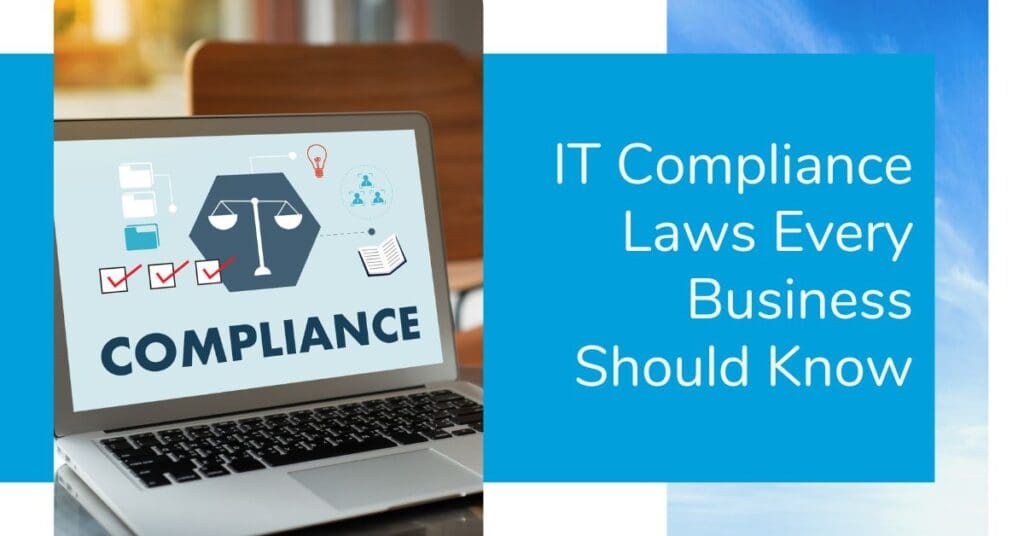IT Compliance Laws Every Business Should Know

Partnering with an IT provider that is well-versed in IT compliance laws is crucial for industries like medicine, government, education and more. Here is a breakdown of some of the most important compliance laws your IT provider should be aware of.
CCPA Compliance
CCPA stands for the California Consumer Privacy Act (2018). This law gives consumers more control over how much of their personal information is shared with businesses. It gives more privacy rights to consumers including:
- The right to opt out of the sale of their personal information
- The right to delete personal information that has been collected from them (exceptions apply)
- The right to know what personal information is being collected from them by businesses and how it is used and shared
- The right to non-discrimination for exercising their CCPA rights
Businesses are required by this law to give notice to consumers about what information and data will be collected from them. This law is important even for businesses outside of California as it is expected to roll out to the rest of the country eventually so it is best practice to start following it now.
GLBA Compliance
The Graham-Leach-Bliley (GLBA) affects financial institutions and businesses that sell financial services and goods to consumers. It requires them to disclose the kind of consumer information they share and why. The most important thing it does is allow consumers to opt out of their information being shared with third parties.
CMMC Compliance
Cyber Security Maturity Model Certification (CMMC) compliance is necessary if your business works with the Department of Defense. CMMC is meant to protect controlled unclassified information (CUI) across the DoD supply chain.
CUI incorporates any information or data created or owned by the government or another entity on the government’s behalf. This data can include financial, legal, intelligence infrastructure, export controls and more.
PCI DSS Compliance
Payment Card Industry Data Security Standard (PCI DSS) protects the storage and transmission of credit, debit and cash card data by businesses. Compliance with the PCI can create a foundation of mutual benefits between you and your consumers.
By building and maintaining secure networks and systems and regularly checking your systems for vulnerabilities, you can provide customers with active data protection and even seek out potential threats to their data.
GDPR Compliance
In 2016 the European Parliament developed the General Data Protection Regulation, and it applies to all 28 European Union (EU) member states. The regulation protects EU citizens and their personal data during transactions in the EU. The regulation requires businesses to provide a reasonable level of protection for personal data and failure to comply can result in fines.
HIPAA Compliance
Chances are you’ve probably heard of HIPAA, especially if you are in the healthcare industry. The Health Insurance Portability and Accessibility Act Privacy Rule supplies consumers important privacy rights and protection when it comes to their medical and health information. It controls how their information is used and disclosed by health providers.
Ensuring you have strong privacy protections in place is vital to maintaining individuals’ trust in their healthcare providers and their willingness to receive crucial health services and tests. These protections are especially important when mental health information is involved or mentioned.
Choose SkyTerra to Stay In Touch With IT Compliance Laws
SkyTerra technologies are well-versed in IT compliance laws and regulations. We know what you are required to have in your systems and processes so you stay in compliance. Never worry about IT compliance again with SkyTerra by your side. Book a meeting with us to get started.
